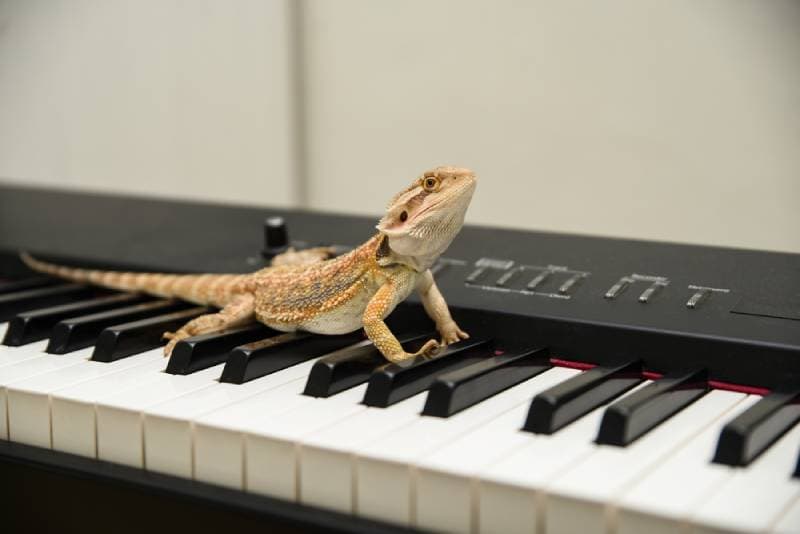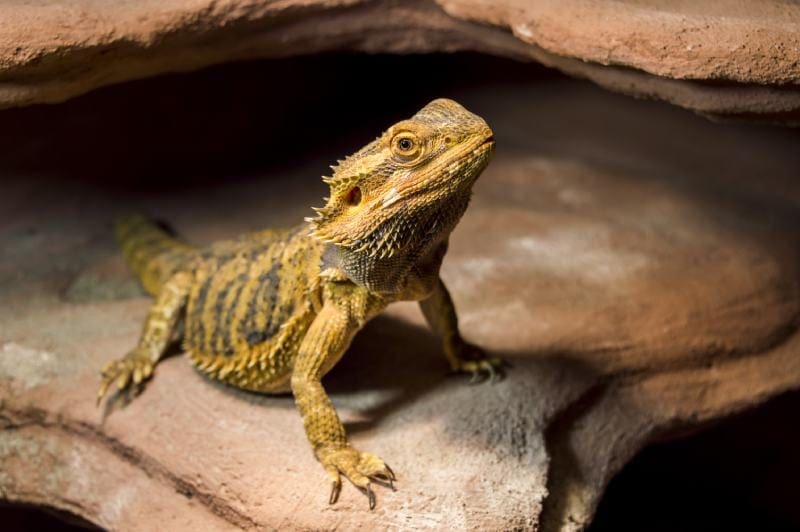Are Bearded Dragons Poisonous? Bite Risks & How To Prevent Them

Updated on
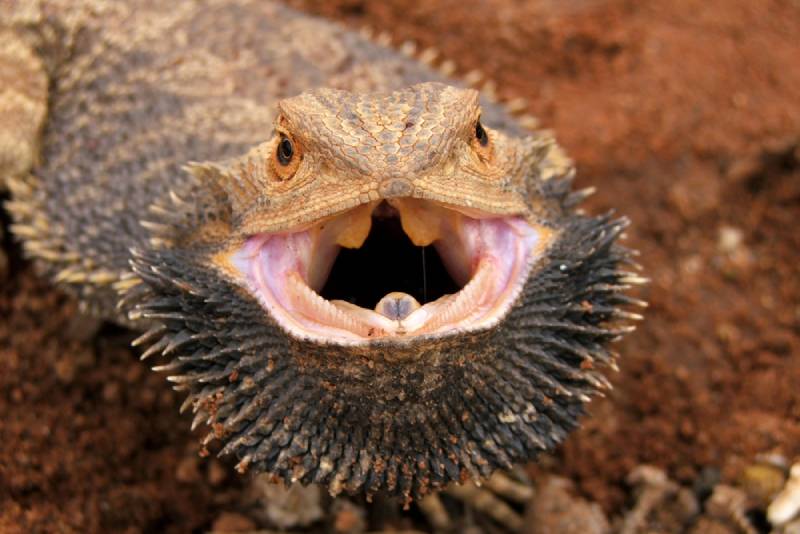
If you are considering a Bearded Dragon as a pet, it is important to know everything there is to know about the species so that you can provide it with the best care.
Bearded dragons are gentle, social, and friendly pets that are not poisonous. However, you may be surprised to know that they are venomous. This doesn’t necessarily mean they are risky pets, as their venom is non-toxic to humans, but if you happen to get nipped by your reptile friend, it could draw blood. Read on to learn more about the unassuming venomous Bearded Dragon and its bite so that you can safely handle your pet.

What Is the Difference Between Poisonous & Venomous?
The terms venomous and poisonous have different meanings. The fundamental difference is in how the toxin enters the body. Biologists state that the term poisonous refers to organisms that release poison when you ingest them, while venomous applies to an organism that injects toxins through a bite or sting.
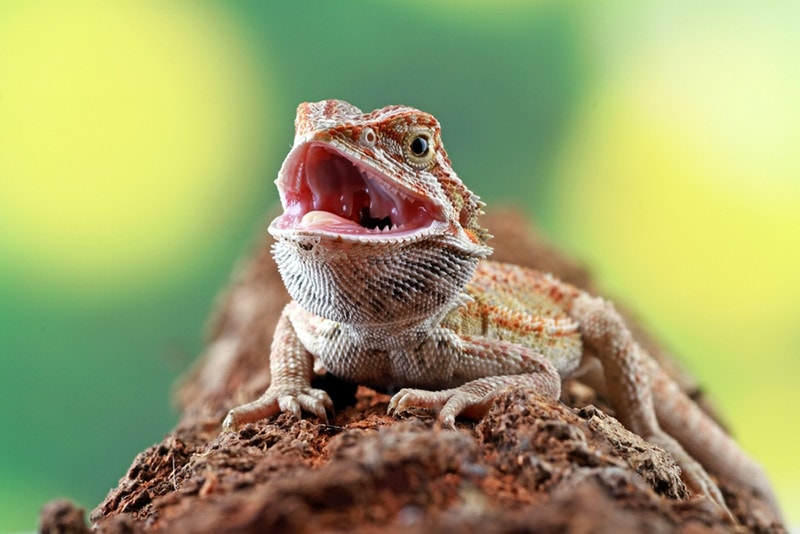
Are Bearded Dragons Poisonous to Humans?
Australian scientists carried out tests in 2005 which revealed that Bearded Dragons are venomous.1 The venom that it contains has many similarities to rattlesnake venom, known as crotamine. Both the lower and upper jaws have glands that contain venom, and when they bite, it is secreted.
However, a Bearded Dragon’s venom glands are considered vestigial, which means that they no longer serve the same function as they did in the past. The venom secreted by a Bearded Dragon is also mild and is non-toxic to humans.
Are Bearded Dragons Hazardous Pets?
For many years Bearded Dragons were not considered venomous and venomous bites were always thought of as something relative to snakes. Now that you have learned they are venomous, you may wonder if keeping them as pets is risky. No; they are not dangerous to humans as long as they have a suitable environment and healthy diet.
Their venom is only lethal enough for small prey and is made of smaller molecules than snake venom, which means that a reaction is much less likely if you’re bitten. It is said that salmonella is more worrying than a Bearded Dragon’s venom, and even that risk is weakened by taking the correct precautions.
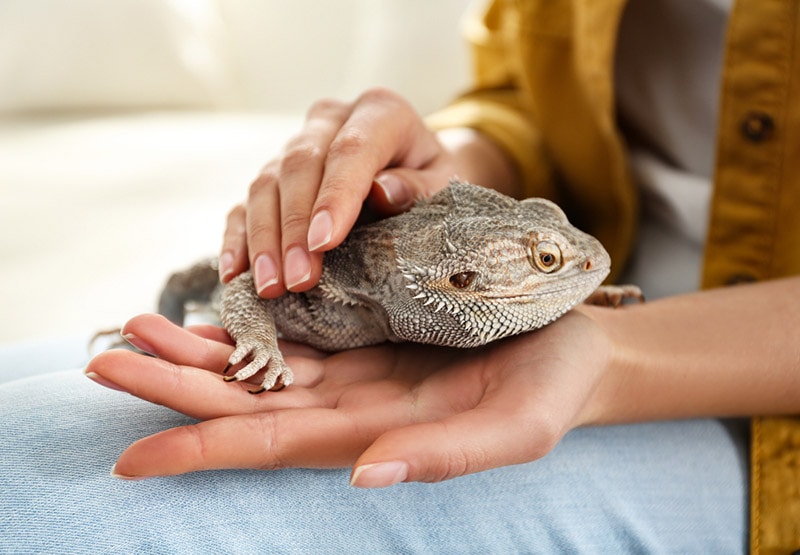
A Bearded Dragon’s Bite
So if the venom of a Bearded Dragon is mild, is it serious if it bites you? Bearded dragons very rarely bite since they typically have a passive temperament and will avoid conflict with humans, and even if they do, it is not serious. However, you may feel a little pain due to the sharp teeth, but that pain will be short-lived. In fact, rather than feeling pain, the bite will feel more like a burn or sharp tingle and a lot less painful than if your dog bit you. If your pet bites you, it may draw blood, and the wound may swell a little.
The venom won’t be harmful to humans unless they have an allergic reaction. However, salmonella is something of concern. A salmonella infection can cause intestinal problems and fever. Bearded dragons carry the bacteria in their mouths, which can be passed on to humans. If you get bitten, look out for allergy symptoms and seek medical attention if any signs of an allergic reaction show up. Clean the site thoroughly and apply an antibiotic cream and cover it with a bandage.
How to Prevent a Bite from Your Bearded Dragon
It is fairly simple to prevent your Bearded Dragon from biting you. Along with keeping your pet healthy and happy, here are a few helpful tips.
- When a Bearded Dragon is agitated or stressed, it may bite. Keep an eye out for signs of agitation and stress, such as their beard puffing out and turning black. Avoid picking your dragon up or attempting to handle it until it is calm. If in the event you need to handle your dragon, wear thick gloves as a precautionary measure.
- Be sure to handle your Bearded Dragon properly. Avoid approaching your Bearded Dragon from above since it may confuse you for a predator. Support their legs and place your hand under their belly to gently lift them up. It is also important to educate your children on how to correctly handle a Bearded Dragon.
- Avoid feeding your reptile by hand. They may be hungry, and if you feed them by hand, they may end up biting you. Instead, use a pair of tweezers or a food bowl.
- Keep your Bearded Dragon happy and healthy with a well-balanced diet of 80% plants and 20% insects. Ensure its terrarium setup is similar to its natural habitat. Choosing the correct size will help your dragon feel less stressed and comfortable. Keep its terrarium out of direct sunlight, away from loud noises, and somewhere where it is dark at night.
- Your dragon will need regular baths, playtime, and exercise. If you provide your Bearded Dragon with all these things, along with lots of love, it will be a healthy, stress-free, and happy pet.
- For your safety, always wash your hands before and after handling your pet.

Final Thoughts
While Bearded Dragons are not poisonous, they are surprisingly venomous. However, they are perfectly safe to keep as pets since their venom is non-toxic to humans, and they rarely bite. You can easily prevent biting by learning to handle your pet Bearded Dragon and keeping it healthy and happy. Don’t let the fact that they are venomous sway you, as these reptiles make excellent pets. They are friendly, social, and gentle as long as they are happy and well cared for.
See Also:
Featured Image Credit: Ashley Whitworth, Shutterstock

